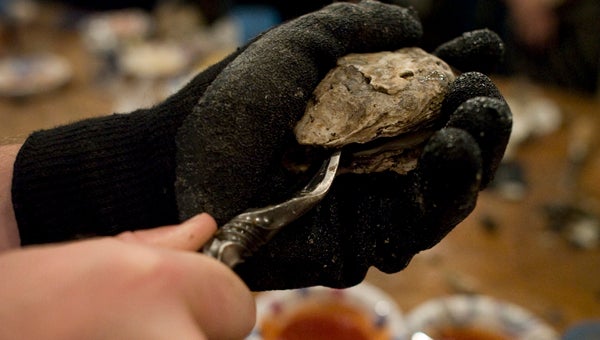Area lawmakers seek to protect, improve industry
Published 6:57 pm Wednesday, April 22, 2015

FILE PHOTO | DAILY NEWS
COASTAL TREASURE: Oysters have long been a coastal North Carolina treasure, served up at oyster roasts all over the region and other parts of the state. A bill in the N.C General Assembly, if it becomes law, would require the state to develop a 10-year plan regarding improving the state’s shellfish aquaculture industry.
Commercial fishing is a huge industry in coastal North Carolina, and easy access to and from the Atlantic Ocean, Pamlico Sound and Albemarle Sound are key to keeping that industry healthy.
That’s why area legislators have filed bills or support bills dealing with commercial fishing and related items. State Sen. Bill Cook, a Republican from Beaufort County who represents District 1, is a primary sponsor of Senate Bill 160, which addresses the dredging and maintenance of the state’s waterways to enhance safety and commerce. That bill was approved in the Senate Committee on Appropriations (base budget) on April 1.
“The bill requires the State of North Carolina’s Department of Environment and Natural Economic Resources to draft a memorandum of agreement with the United States Army Corps of Engineers on Oregon Inlet and other waterways. The legislation increases the current state appropriations by $1.7 million in the Shallow Draft Inlet Fund, and appropriates $4 million to Oregon Inlet for an intermediate dredging plan. The bill also addresses the unfunded mandate that was tasked to Secretary (Bill) Daughtridge (Jr.) at the Department of Administration (DOA) in last year’s budget,” Cook wrote in an email about the bill. “Therefore, it appropriates $1 million to DOA for the Department (so it) can retain counsel and prepare to meet the deadlines required in state statute. The bill also appropriates $150,000 to reimburse DOA for its costs associated with exploring options for acquiring Oregon Inlet and the adjacent real property, including, but not limited to, surveys and appraisals, legal research, and studies related to sand management, engineering proposals, and larval transport. In addition, the legislation requires the Department of Administration to initiate negotiations with the federal government for an agreement to acquire the federally owned property necessary for managing deep draft navigation channels at the Port of Morehead City.”
Cook notes that the bill establishes a Deep Draft Dredging and Maintenance Fund. However, it requires state appropriations credited to the Deep Draft Fund to be cost-shared on a one-to-one basis with funds provided by the State Ports Authority. The bill is scheduled to be heard by the Senate Committee on Finance, according to Cook.
State Rep. Paul Tine, an unaffiliated legislator from Dare County who represents District 6, supports legislation that would increase Dare County’s sale tax by a quarter of one cent and earmark that revenue for dredging within county waters. House Bill 388 was approved by the House on its third reading April 1. It was sent to the Senate Committee on Rules and Operations after being approved on its first reading in the Senate on April 6.
“From ferry replacement, to inlet dredging, to tax policy, to rural schools funding, to oyster restoration, to fishing issues, I could name another dozen bills that are important for the district. It is tough to even narrow it down to just four (even though I know you asked for three). Needless to say, there is a lot of work to be done for eastern North Carolina over this long session,” according to Tine.
State Rep. Michael Speciale, the Craven County Republican who represents District 3, supports House Bill 302 in an effort to strengthen the state’s oyster industry. Tine also supports the bill.
The bill was approved on its third reading in the House on Tuesday. It was sent to the Senate on Wednesday. The bill, if it becomes law, would require the N.C. Department of Environment and Natural Resources to study the state shellfish lease and franchise program, including “the regulatory, statutory, and other obstacles faced by the private shellfish aquaculture industry in establishing or expanding shellfish cultivation operations; (ii) a summary of shellfish leasing and franchising programs in other states and a comparison of the private shellfish aquaculture industry in North Carolina compared to other states; (iii) the economic and logistical feasibility for public‑private partnerships to engage in State‑based production of viable oyster seed through the creation of one or more production hatcheries in North Carolina; and (iv) recommendations for best practices to achieve greater opportunities for North Carolina’s shellfish aquaculture industry and greater program efficiencies and outcomes, including the development of a 10‑year plan for the encouragement and enhancement of shellfish aquaculture,” according to the bill.
The bill requires the division to report its findings and no later than April 1, 2016, to the chairmen of the Environmental Review Commission, the chairmen of the House of Representatives Appropriations Committee on Agriculture and Natural and Economic Resources, the chairmen of the Senate Appropriations Committee on Natural and Economic Resources and the Fiscal Research Division.






